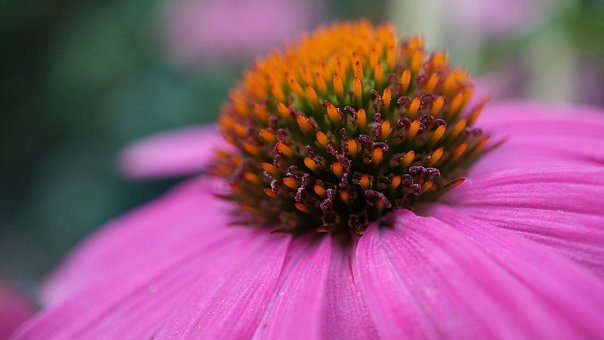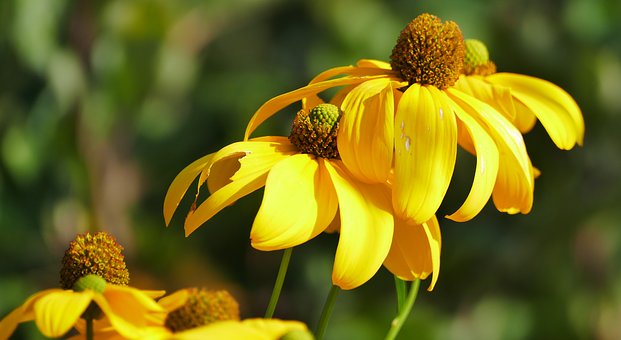What Role Does Echinacea Play in on Treating Gynecological Diseases?

Echinacea is a kind of wild flowers in Compositae, which is native to North America and Canada. Because of its outstanding immune function, anti-bacterial, anti-inflammatory, anti-virus and other functions, it has become a popular immune promoter in Europe and the United States.
In 1998, the release of the film The Patriot directed by Dean Samler, the Oscar winner for best photography, immediately triggered an upsurge of Echinacea in Europe and the United States. Nowadays, it has become one of the important directions of medical research to develop immune promotion, regulation and inhibitors from natural products.
Echinacea, with its ability to treat the virus and bacterial respiratory tract infection, has become a well-deserved expert in medicinal plants. In recent years, more and more attention has been paid to the medicinal value of Echinacea, which has become one of the plant medicinal materials with the greatest demand in the international market.
There are many reports on the chemical constituents of Echinacea. It is confirmed that the main chemical constituents of Echinacea include polysaccharides, caffeic acid derivatives, volatile oil, polyacetylene, alkylamide and flavonoids. Echinacea preparation has the functions of enhancing immunity, anti-inflammation, and anti-infection. So far, it is one of the few medicinal plants found in the world that have the dual functions of enhancing immunity and diminishing inflammation.
Echinacea has a wide range of medicinal applications and stable and exact therapeutic effects, which are mainly used to promote the immune function of the body, fight against various infections, increase leukocytes, inhibit hyaluronidase, fight against bacteria and fungi, promote tissue regeneration, eliminating inflammation, improving cellular immune function and inhibiting tumor.
#p#副标题#e#
The polyacetylene component of Echinacea root can inhibit Pseudomonas aeruginosa and Escherichia coli in vitro. It can inhibit the growth of other bacteria in varying degrees, especially staphylococcus aureus, group B streptococcus and Staphylococcus epidermidis.

The antifungal test showed that Echinacea polysaccharide could resist Candida infection. Roesler et al. Found that Echinacea polysaccharide can prevent Candida albicans infection in mice. Stelnmuller et al. Also reported that Echinacea polysaccharide could prolong the life of mice infected with Candida albicans.
Echinacea extract has been widely used in clinical, such as assisting various antibiotics to treat various serious bacterial infections. Echinacea showed a significant immune effect in improving immunity, especially in the state of low immunity. It has different effects on the common cold and upper respiratory tract infection, gynecological diseases, urinary system infection, chronic prostatitis, candidiasis and other diseases.
From this point of view, Echinacea has some preventive and therapeutic effects on gynecological diseases, but some people may have allergic reactions to Echinacea, such as skin rash. Therefore, people with asthma or allergy to weeds should avoid consuming such products. It needs to be combined with other herbs for better effect. Consult your doctor before use to avoid unnecessary side effects.
You may also be interested in:
Therapeutic Effect of Ginger on Gynecological Diseases
previous pageCan Green Tea Treat Blocked Fallopian Tubes?
next page
You may also be interested in
- Endometriosis and Debilitating Bowel & Bladder Pain: Diagnosis, Treatments, and Hope for Relief
- Struggling with Endometriosis Symptoms? Proven Back Pain and Painful Sex Relief Options
- Adenomyosis with Unbearable Cramps: When Painkillers Don't Work—Natural Relief with Fuyan Pill
- Managing Adenomyosis: Easing Pelvic Pain and Heavy Menstrual Bleeding with Natural Approaches
- What Are the Natural Herbal Remedies for Relieving Dysmenorrhea?
Testimonials
- Adenomyosis with Ureaplasma Urealyticum Cured by Fuyan Pill
- Tubal blockage with hydrosalpinx can be cured by TCM shortly
- Fuyan Pill Helps A woman with Adenomyosis Get Pregnant
- A Woman with Hydrosalpinx Is Cured with Fuyan pill
- Pelvic Inflammatory Disease Testimonials
- Irregular Vaginal Bleeding and Endometrial Thickening Cured by Fuyan Pill
- Pruritus Vulvae and Frequent Urination: Mycoplasma Infection Cured after 2 Courses



